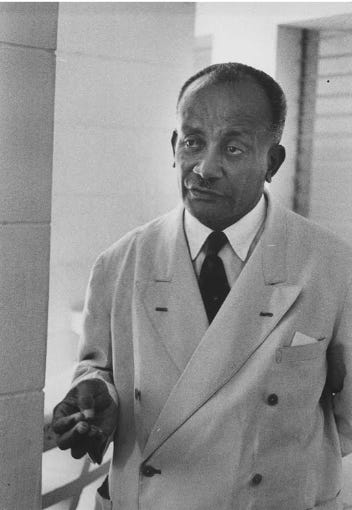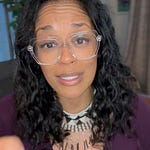FORTIFY
March 30, 2025- This morning, I appeared on ABC News Live for a timely conversation with news anchor, Janai Norman.
Our chat covered a range of topics, beginning with immigration, student protestors and the disturbing ICE detainments of international scholars whose student visas are being revoked by the federal government without charge or reasonable explanation.
In that portion of the conversation, I reiterated the ways in which historically Black colleges and universities have been longtime international hubs that stand at the intersection of activism, social justice and civil rights-the very actions and themes under constant attack by the Trump administration. For these reasons and more, I’ve challenged my student journalists to cover federal government impact on HBCUs. This requires me to transform the classroom into a working newsroom.
Earlier this month, my social justice journalism student Elijah Qualls published a well-written and revealing story on Morehouse College’s plan to confront a potential ICE raid. Elijah’s important work appears here in Capital B-a Black-led nonprofit digital newsroom that graciously agreed to be our publishing partner. The story has been picked up by Black Enterprise and Blavity, while providing plenty of room for reflection and thought about the wide-ranging impacts of these ICE raids-from mental health to human rights and violation of due process (often accompanied by outlandish accusations of harboring terroristic sentiments by promoting pro-Palestinian beliefs).1 The need for due process is highlighted in an interview with the Morehouse campus police chief in which he vows to verify federal warrants before allowing any federal agents to breach the campus security gate. He offers a commitment to the dignity of those who may be at risk for deportation, declaring “You’re not going to drag people out of here in handcuffs.”

Until this story was published more than a week ago, there had been little-if any-focus on the international populations at HBCUs in these times. Yes, there are more obvious faculty members concerns about their own protections as outlined in the piece.
But rarely do the mainstream narratives we’ve read focus on Black student populations-particularly those within the African Diaspora-that should be included in the documentation of this moment.
I’ve studied international liberation movements within the HBCU while researching material for my forthcoming book. The story follows my great-grandfather’s medical school and practice journey as I outline the fight for civil rights through the lens of Black physicians over more than a century.
My great-grandfather—who hailed from Jamaica and studied at Howard University- was a supporter of a West Indian Federation during the early 20th century, both as a student and then as a physician in Harlem.
The short-lived federation—a political body meant to exert its power as a single unit of island nations independent of the British Empire and its colonialism- did not really take shape until 1958. That was more than three decades after my great-grandfather activated for the independence and an international civil rights movement as a young scholar and professional.



The newspaper clips above show how that international activism landed at Howard University in March of 1960. That’s when the federation’s first and only prime minister, Barbadian Grantley Herbert Adams , came to visit students and promote the movement.
At the time, Howard had a reported 300 students who hailed from the West Indian nations determined to solidify their independence. There’s no doubt in my mind that these mostly Black non-citizens, studying legally in the United States and often engaged in political turmoil, would have had some of the same concerns about today’s ICE enforcement as the Morehouse students featured in Elijah’s recent piece.
How would their stories have been covered today?
During the remainder of my conversation with Janai this morning, we talked about the attack on the Smithsonian, the distortion of history, and what my years of reporting on education led me to think about the attempt to dismantle the Department of Education.
But the question that’s sticking with me this afternoon is the one Janai asked about how I am teaching journalists to cover this second Trump administration. Here’s what I said:
“This idea of covering an administration that is-let’s be completely honest-living in an alternate reality, moving towards erasure of the truth, of reality, of history ….I’m teaching them to cover the moment in the spirit of the historic Black press.”
“And I say that because we don’t have a complete history of America without the presence of the historic Black press. I always say if you were an alien and you dropped down on Earth, you dropped down in America, pick a year-1947-and you look at A1 of the Black press and you look at A1 of mainstream press, which front page gets you closer to the truth of what’s happening in America?”
Without missing a beat, I continue.
“It is no doubt the Black press that serves as that guide, that guiding light. And so this is what I’m teaching them. That this idea of objectivity, it only works when we are standing in facts. And once we have the facts, it is not our duty to be stenographers for what an administration says. Let the public know that, but lead with the truth. These aren’t hard concepts, but I think we’ve struggled with this over the past decade….We need to lean into history as our guide and we absolutely need to be unapologetic in our truth and that starts with the framing of our stories.”
Janai gave a nod to Fortify and the historical context that you will find in this newsletter. I welcome you to listen to the rest our conversation here on ABC News.com, and browse through the Fortify newsletter homepage to explore how I’ve used archives to help us grapple with this moment and center Black storytellers.
A big thanks to Janai Norman, producer Lynn Hilton and the team at ABC News Live for having me join you on this first day of a new week.
I am returning to work on book edits, but I hope you’ll journey with me as we continue to think about how we fortify ourselves and others in this moment-by de-centering alternate realities and covering these times in truth.
Navarro, M. (n.d.). UA student reportedly detained by ice. The Crimson White. https://thecrimsonwhite.com/120415/news/ua-student-reportedly-detained-by-ice/#











Share this post